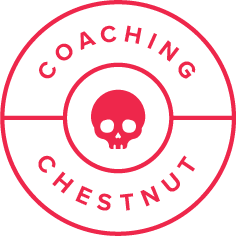There are things we know by now as adults, right? Like how we’re supposed to replace the word “but” with “and” in conversations (if we care at all about being socially intelligent)… like how we all know by now to not leave the tap running while we brush our teeth (like we did with reckless abandon before Matt Damon told us not to)… like how we know the second donut is never as emotionally satisfying as we hope it will be (although a girl can try). The list goes on.
 There are a few coaching chestnuts that any coach worth their weight in framed certifications knows to be true, too. I’m going to share one that’s usually drilled in on the first morning of training, and it’s all about the danger of the should.
There are a few coaching chestnuts that any coach worth their weight in framed certifications knows to be true, too. I’m going to share one that’s usually drilled in on the first morning of training, and it’s all about the danger of the should.
Coaches are taught to listen for the word “should” when a client talks, and then to pounce all over it with whatever weapons are handy. We are trained to snuff the life out of the should, even if it’s with our bare hands.
(It’s also at this point that many coaches advise their client to “stop shoulding all over yourself,” amused at their little play on words. Run far and fast if any coach encourages you to laugh along with them, and not just because they are about to maim you.)
What’s the problem with should?
Should implies an obligation that we maybe didn’t sign up for… something we’re not doing but are supposed to be doing… what we think we’ll get in trouble for if/when we don’t do it. It’s often swampy and heavy and laced with burden. “I should tell my manager about the project delay” carries the weight of you having to do something that may or may not be true, but you’ve lathered it in judgment that you need to or else. “I should call my Mom tonight” reeks of an obligation that may or may not be legit. Even if it is legit— like if your Mom is about to file a missing person’s report because you’ve been AWOL for weeks— are you framing the task in the best way possible?
Researchers wisely recommend replacing the “should” mindset with a “could” mindset to broaden our perspectives and spur unconventional thinking.
Could carries an air of possibility to it— chock full of agency. Oh! The a-word! Agency packs a well-being punch because our species loves autonomy and the freedom to choose things— like whether we really need to tell our manager about the project being delivered on Wednesday instead of Tuesday, or whether we actually do need to call our Mom tonight. “I could tell my manager about the project delay” has a different ring to it, doesn’t it? “I could go back to school” is energetically different than it’s nagging version of “I should go back to school,” isn’t it?
When you’re in a should spiral (and those of you People Pleasers out there, I’m looking straight into your eyes and don’t you dare avert my gaze, because YOU REALLY DO SHOULD ALL OVER YOURSELVES [ew, sorry]), just take note. Do the thing you do in Word or Excel when you “find and replace” a word or name when you need to. Find the should, then replace with could. It won’t always work (like how “and” just doesn’t cut it when you really want to say “but”), but trust me, it’s worth it. You should try it.







